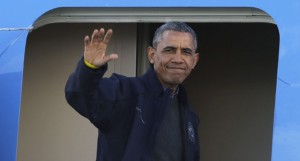Rights group urges Obama to push issue on PH slays
MANILA, Philippines—Visiting US President Barack Obama should press President Aquino to fulfill his promise to improve respect for human rights and accountability for abuses, Human Rights Watch said on Sunday.
The Aquino administration has undertaken reforms, but has so far failed to match his pronouncements with action to end impunity for extrajudicial killings, torture and enforced disappearances, according to the New York-based watchdog.
It said that while abuses had dropped since the Arroyo administration, killings of activists, environmental advocates and local politicians continued with “alarming frequency.”
In many cases of political killings, local authorities and security forces were involved, it said.
In a letter to Obama last month, Human Rights Watch urged the president to raise concerns about rights issues during his meeting with Aquino and to use future US military cooperation as an incentive for the government to investigate and prosecute abuse cases.
PH still a risky place
“President Obama should make clear that US assistance to the Philippine military is linked to abusive personnel being held to account,” John Sifton, Asia advocacy director of Human Rights Watch, said in a statement. “A strong US position on rights can only strengthen Aquino’s hand in combating abuses.”
Sifton said the Philippines remained a “risky place to be an outspoken activist or muckraking journalist.”
“People taking on powerful local interests all too frequently make the news as victims, and those responsible for killings are almost never prosecuted,” he said.
According to Human Rights Watch, 12 journalists were killed in 2013, raising the number of slain media practitioners to 26 since Aquino took office in 2010. Police arrested the suspects in only six of these cases.
Death squads
Local authorities in a number of urban areas have also been implicated in “death squads,” blamed for the execution of dozens of suspected petty criminals, drug dealers and street children.
The Philippine military and various insurgent groups, including the communist New People’s Army and Moro rebel groups, have also been implicated in serious abuses in the context of armed conflict.
During fighting in September 2013 between followers of disgruntled Moro leader Nur Misuari and government troops in Zamboanga City, the watchdog documented violations by both sides, including the use of human shields by the rebels.
A large number of those displaced last year by the fighting in Zamboanga City are stuck in evacuation camps, “transitional sites” or shelters with poor living conditions.
In the past seven months, more than 100 of the displaced have died, mostly children and infants, largely from preventable, sanitation-related illnesses, the watchdog said.
The US Congress has imposed conditions on assistance to the Philippine military since 2008, withholding portions of yearly funding until the Philippine government shows a better record on prosecuting extrajudicial killing cases.—Reports from TJ Burgonio and Germelina Lacorte, Inquirer Mindanao
Originally posted: 5:41 pm | Sunday, April 27th, 2014
RELATED STORIES
US, Philippines reach deal on troops
Obama visit in the PH means no-fly, no-sail zones; red alert up















